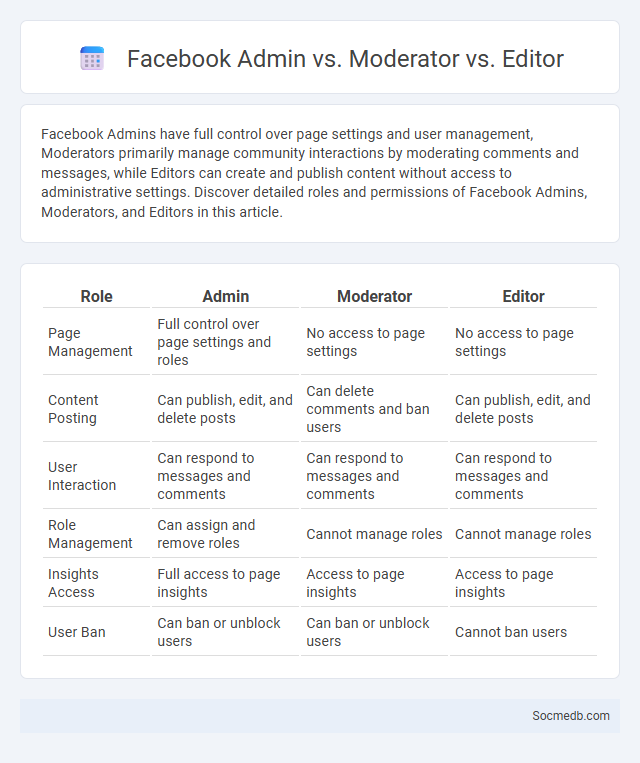
Photo illustration: Facebook Admin vs Moderator vs Editor
Facebook Admins have full control over page settings and user management, Moderators primarily manage community interactions by moderating comments and messages, while Editors can create and publish content without access to administrative settings. Discover detailed roles and permissions of Facebook Admins, Moderators, and Editors in this article.
Table of Comparison
| Role | Admin | Moderator | Editor |
|---|---|---|---|
| Page Management | Full control over page settings and roles | No access to page settings | No access to page settings |
| Content Posting | Can publish, edit, and delete posts | Can delete comments and ban users | Can publish, edit, and delete posts |
| User Interaction | Can respond to messages and comments | Can respond to messages and comments | Can respond to messages and comments |
| Role Management | Can assign and remove roles | Cannot manage roles | Cannot manage roles |
| Insights Access | Full access to page insights | Access to page insights | Access to page insights |
| User Ban | Can ban or unblock users | Can ban or unblock users | Cannot ban users |
Understanding Facebook Page Roles
Facebook page roles define specific permissions for managing your business or community page, ensuring secure collaboration among team members. Roles range from Admin, who has full control, to Moderator, Editor, Advertiser, and Analyst, each with tailored capabilities such as content creation, message response, ad management, and insights analysis. Understanding Facebook Page roles empowers You to assign appropriate access levels, protect your brand, and streamline page management efficiently.
Overview: Admin, Moderator, and Editor Roles
Admin, Moderator, and Editor roles are essential for effective social media management and community engagement. Admins have full control over account settings, user permissions, and content policies, ensuring smooth platform operation. Moderators focus on monitoring interactions, enforcing community guidelines, and managing user behavior, while Editors handle content creation, scheduling, and publication to maintain consistent and relevant social media presence.
Key Responsibilities of a Facebook Admin
A Facebook Admin manages page content by creating, scheduling, and publishing posts to engage followers and maintain active community interaction. They monitor comments and messages to respond promptly, ensuring a positive user experience and addressing any concerns or inquiries. Admins also analyze engagement metrics and insights to optimize content strategy and improve page performance.
What Does a Facebook Editor Do?
A Facebook editor manages content creation, curates posts, and optimizes engagement by analyzing audience insights and platform algorithms. They craft compelling headlines, select relevant images, and schedule updates to maintain consistent brand presence on Facebook. Monitoring performance metrics and adjusting strategies ensures maximum reach and interaction within target demographics.
Role and Duties of a Facebook Moderator
A Facebook moderator ensures community guidelines are strictly followed by monitoring user-generated content, removing inappropriate posts, and managing conflicts. They facilitate healthy interactions by enforcing platform policies and addressing harmful behavior such as hate speech, harassment, or misinformation. Effective moderation promotes user safety, engagement, and maintains the integrity of the Facebook community.
Permissions: Admin vs. Editor vs. Moderator
Social media platforms assign different permissions based on roles like Admin, Editor, and Moderator to manage content and user interactions effectively. Admins typically hold full access, including user management, content oversight, and settings adjustments, while Editors can create and edit posts but lack control over user permissions. Moderators focus on community management, such as monitoring comments, enforcing guidelines, and handling user reports without altering content or platform settings.
How to Assign Facebook Page Roles
Assigning Facebook Page roles is essential for managing your business's online presence effectively. You can assign roles such as Admin, Editor, Moderator, Advertiser, or Analyst directly from your Page Settings under "Page Roles." Ensure you select the appropriate role based on the responsibilities you want to delegate to your team members, giving you control over your social media management.
Security Implications of Each Role
Social media platforms introduce distinct security implications based on user roles, where administrators face risks of unauthorized access and data breaches due to elevated privileges. Content moderators must navigate threats involving exposure to harmful or misleading content while safeguarding personal information. Regular users encounter phishing attacks, account hijacking, and privacy invasions that demand vigilant security practices and strong authentication measures.
Best Practices for Managing Facebook Roles
Effectively managing Facebook roles ensures your page runs smoothly and securely by assigning appropriate permissions to team members based on their responsibilities. You should regularly review and update roles such as Admin, Editor, Moderator, and Analyst to maintain clear accountability and prevent unauthorized access. Prioritizing role management protects your brand's reputation while optimizing collaboration and content delivery for your audience.
Choosing the Right Facebook Role for Your Team
Selecting the appropriate Facebook role for your team streamlines content management and enhances security by defining clear permissions such as Admin, Editor, Moderator, Advertiser, and Analyst. Assigning roles based on responsibilities ensures efficient handling of posts, ads, comments, and insights while protecting sensitive account settings. Proper role allocation optimizes collaboration and maintains control over your Facebook Page's activities and audience engagement.
 socmedb.com
socmedb.com